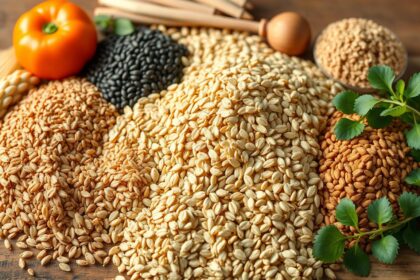Losing weight can be tough, but supplements might help. This guide looks into weight loss supplements, explaining how they aid in losing weight and speeding up metabolism. We’ll cover proven options, comparing natural and man-made ones, and focus on their safety and how well they work.

We’ll check out green tea extract and protein powders, among others, that can help you reach your weight loss goals. You’ll discover important vitamins and minerals for managing weight. Plus, we’ll talk about how to use these supplements with a balanced diet and exercise for the best results.
Key Takeaways
- Dietary supplements can support weight loss efforts
- Supplements work by boosting metabolism and promoting fat burning
- Both natural and synthetic options are available for weight loss
- Green tea extract and protein supplements are popular choices
- Combining supplements with diet and exercise yields best results
- Safety and quality are crucial when choosing weight loss supplements
Understanding the Science Behind Weight Loss Supplements
Weight loss supplements are popular for helping people lose body fat and boost their metabolism. They work with your body’s natural processes to aid in weight management.
How Weight Loss Supplements Work in the Body
These supplements aim to increase energy and lower calorie intake. They can also boost your metabolism, helping you burn more calories. Some supplements help control hunger, making it easier to follow a diet.
The Role of Metabolism in Weight Management
Metabolism is key in weight loss. It’s how your body turns food into energy. A faster metabolism means you burn more calories, even when you’re not active. Some supplements claim to speed up metabolism, helping with weight loss.
Interaction Between Supplements and Natural Body Processes
Dietary supplements interact with your body in different ways. Some increase thermogenesis, the body’s heat production, which burns more calories. Others affect hormones that control hunger and fullness. Knowing how these interactions work helps in picking the right supplements for weight loss.
| Supplement Type | Primary Effect | How It Works |
|---|---|---|
| Thermogenics | Boost metabolism | Increase body heat production |
| Appetite Suppressants | Reduce calorie intake | Affect hunger hormones |
| Fat Burners | Increase fat oxidation | Enhance breakdown of body fat |
What Supplements Boost Weight Loss: Evidence-Based Options
Weight loss pills are popular, but not all are good. Research shows some supplements really help with losing weight. Let’s look at some proven options that support weight loss.
Green tea extract is a strong natural choice. It’s full of antioxidants that boost metabolism and burn fat. Studies show it can help burn more calories and fat, making it great for weight loss.
Caffeine is another key ingredient in weight loss pills. It gives energy and boosts metabolism. It can also help burn fat and improve workouts. Adding caffeine to other supplements can make them work better.
CLA for weight loss has become popular lately. It’s a fatty acid found in meat and dairy. It might help cut down body fat and keep muscle mass. Some studies suggest it could be effective.
- Green tea extract: Boosts metabolism and fat burning
- Caffeine: Increases energy and enhances fat oxidation
- CLA: May reduce body fat and preserve muscle mass
- Vitamins and minerals: Support overall health and metabolism
Vitamins and minerals are key for weight management. Not having enough can slow down weight loss. Supplements like vitamin D, B-complex vitamins, and minerals like iron and magnesium help with metabolism and energy. They can aid in weight loss.
Remember, these supplements are best when used with a healthy diet and exercise. Always talk to a doctor before starting any new supplements.
Natural vs. Synthetic Weight Loss Supplements
When looking at weight loss supplements, you face a choice between natural and synthetic options. Each type offers unique benefits for burning fat and boosting metabolism. Let’s dive into these categories to guide you in your weight management journey.
Plant-Based Weight Loss Supplements
Natural supplements come from plants and contain compounds that help with weight loss. Green tea extract, for instance, is full of catechins that speed up metabolism. Garcinia cambogia, from a tropical fruit, might curb hunger. These plant-based options appeal to those who prefer a natural approach to losing weight.
Laboratory-Created Weight Loss Formulations
Synthetic supplements are made in labs to mimic or boost natural compounds. They often include ingredients like caffeine anhydrous or synephrine. These can help burn fat and boost energy. Even though they’re not natural, they can be very effective for weight loss when used right.
Comparing Effectiveness and Safety Profiles
Both natural and synthetic supplements can aid in weight management. Natural ones might have fewer side effects but work slower. Synthetic ones can offer quicker results but might have more side effects. Always talk to a healthcare professional before starting any supplement to ensure it’s safe and effective for you.
| Supplement Type | Effectiveness | Safety Profile |
|---|---|---|
| Natural | Moderate, gradual results | Generally well-tolerated |
| Synthetic | Potentially faster results | Higher risk of side effects |
Essential Vitamins and Minerals for Weight Management
Vitamins and minerals are key for managing weight. They boost metabolism and energy, helping in your weight loss journey.
B vitamins are important for weight control. They turn food into energy and help with metabolism. You can find B vitamins in lean meats, eggs, and whole grains. If you’re not getting enough, B vitamin supplements can help.
Vitamin D supplements are also crucial. This vitamin helps break down fat and may lower body fat. Many people lack vitamin D, often those in cold places or indoors a lot.
Mineral supplements are also helpful. Calcium, for example, can burn fat and stop it from being stored. Magnesium helps make energy and can reduce water retention.
| Nutrient | Role in Weight Management | Food Sources |
|---|---|---|
| B Vitamins | Boost energy, support metabolism | Lean meats, eggs, whole grains |
| Vitamin D | Aids fat breakdown | Fatty fish, egg yolks, sunlight |
| Calcium | Helps burn fat | Dairy products, leafy greens |
| Magnesium | Supports energy production | Nuts, seeds, dark chocolate |
While these vitamins and minerals help with weight loss, they work best with a balanced diet and exercise. Always talk to a healthcare professional before starting new supplements.
Green Tea Extract and Caffeine: Powerful Weight Loss Catalysts
Green tea extract and caffeine are strong helpers in losing weight. They boost metabolism and increase energy use. This makes them great for those trying to lose weight.
Mechanisms of Action
Green tea extract has catechins, which are antioxidants that boost metabolism. When mixed with caffeine, they work even better. This combo increases fat burning and energy use, helping you lose fat over time.
Recommended Dosages
Experts say to take 250-500 mg of green tea extract each day. For caffeine, aim for 200-400 mg daily, spread out in the morning and early afternoon. Start with small doses and increase as needed to find what works for you.
| Supplement | Daily Dosage | Best Time to Take |
|---|---|---|
| Green Tea Extract | 250-500 mg | Morning or before exercise |
| Caffeine | 200-400 mg | Morning and early afternoon |
Potential Side Effects
Green tea extract and caffeine are usually safe but can cause side effects. These might include:
- Jitters or anxiety
- Insomnia
- Digestive issues
- Headaches
Always talk to a healthcare provider before starting any new supplements. This is even more important if you have health issues or take medications.
Protein Supplements and Their Role in Fat Loss
Protein supplements are important for losing fat. They have essential amino acids that help build and repair muscles. These supplements can also boost your metabolism, helping with weight management.
When you add protein supplements to diet and exercise, they help burn fat better. They keep your muscles strong and make you feel full. This can help you eat fewer calories and lose weight more effectively.
Different types of protein supplements offer unique benefits:
- Whey protein: Fast-absorbing, ideal for post-workout recovery
- Casein protein: Slow-digesting, good for prolonged muscle support
- Plant-based proteins: Suitable for vegetarians and vegans
Adding protein supplements to a balanced diet can improve weight loss. They work best when combined with regular exercise and healthy eating.
| Protein Type | Absorption Rate | Best Time to Take |
|---|---|---|
| Whey | Fast | Post-workout |
| Casein | Slow | Before bed |
| Plant-based | Moderate | Any time |
Remember, protein supplements are not magic pills. They work best as part of a comprehensive approach to weight loss, including a balanced diet and regular exercise routine.
CLA and Other Fat-Burning Supplements
CLA for weight loss is popular for burning fat and reducing body weight. It’s a natural fatty acid found in meat and dairy. It offers promising benefits for managing weight.
Understanding Conjugated Linoleic Acid
Conjugated Linoleic Acid (CLA) is a fat that may help decrease body fat. It boosts metabolism and promotes fat breakdown. Studies suggest CLA can reduce body fat, mainly in the abdominal area.
Timing and Dosage Recommendations
For best results, take CLA with meals. The recommended dose is 3 to 6 grams daily. Start with a lower dose and increase as needed. It’s best to take it throughout the day for consistent fat-burning.
Combining CLA with Other Supplements
CLA can be paired with other supplements for better results. Green tea extract and caffeine enhance CLA’s fat-burning effects. Protein supplements also help when combined with CLA, supporting muscle during weight loss.
| Supplement | Benefit | Recommended Dosage |
|---|---|---|
| CLA | Reduces body fat | 3-6 grams daily |
| Green Tea Extract | Boosts metabolism | 250-500 mg daily |
| Protein Powder | Supports muscle retention | 20-30 grams per serving |
While CLA and other supplements can help with weight loss, they work best with a balanced diet and regular exercise.
Safety Considerations and Potential Side Effects
Taking dietary supplements for weight loss can be risky if not done carefully. It’s crucial to understand the potential side effects and safety concerns before starting any supplement regimen.
People with high blood pressure need to be extra cautious when considering weight loss supplements. Some products can raise blood pressure or interfere with blood pressure medications. A healthcare professional should always be consulted before starting any new supplement, specially for those with existing health conditions.

Supplements must be taken as directed to avoid adverse effects. Common side effects of weight loss supplements include:
- Digestive issues
- Sleep disturbances
- Headaches
- Increased heart rate
It’s important to note that not all supplements are created equal. The FDA doesn’t regulate dietary supplements as strictly as medications, so quality can vary widely between brands.
| Supplement Type | Common Side Effects | Precautions |
|---|---|---|
| Caffeine-based | Jitters, insomnia | Avoid if sensitive to caffeine |
| Protein powders | Digestive discomfort | Start with small doses |
| Fat burners | Increased heart rate | Not for those with heart conditions |
Remember, supplements are meant to support a healthy diet and exercise routine, not replace them. Always prioritize safety and consult a healthcare professional before starting any new supplement regimen.
Combining Supplements with Diet and Exercise
For lasting weight loss, mix supplements with a healthy diet and regular exercise. This combo boosts your chances of success.
Creating a Comprehensive Weight Loss Plan
A good plan balances calories, nutrients, and physical activity. Supplements can help, but they’re not the only solution. Focus on whole foods and regular workouts.
Timing Supplements for Maximum Effect
Timing supplements right can make them more effective. For instance, protein shakes are best after working out. Fat burners might work better before meals. Always check the product instructions and talk to a healthcare expert for advice.
Monitoring Progress and Adjusting Strategy
Keep track of your weight, measurements, and energy levels often. If you’re not seeing progress, tweak your weight loss plan. This could mean changing your diet, exercising more, or trying different supplements.
| Component | Frequency | Importance |
|---|---|---|
| Healthy Diet | Daily | High |
| Regular Exercise | 3-5 times/week | High |
| Supplements | As directed | Medium |
| Progress Tracking | Weekly | Medium |
Remember, supplements are meant to support, not replace, a healthy lifestyle. Sticking to a diet and exercise routine is crucial for reaching your weight loss goals.
Common Myths About Weight Loss Supplements
Weight loss supplements are popular for quick weight loss. But, many myths surround them. Let’s clear up some common misconceptions about these supplements.
Myth 1: Supplements are a magic pill for weight loss. The truth is, no supplement can melt fat without diet and exercise. While some may boost metabolism, they can’t replace healthy habits.
Myth 2: All natural supplements are safe. Just because a product is natural doesn’t mean it’s safe. Some herbs can interact with medications or cause side effects. Always talk to a doctor before starting any new supplement.
Myth 3: You can lose weight without changing your lifestyle. Supplements alone won’t lead to lasting results. The best way to lose weight is through a balanced diet and regular exercise.
| Myth | Reality |
|---|---|
| Supplements guarantee fast weight loss | Results vary; most require lifestyle changes |
| Higher price means better quality | Price doesn’t always reflect effectiveness |
| One supplement fits all | Different bodies respond differently to supplements |
Remember, weight loss supplements should complement a healthy lifestyle, not replace it. Be critical of exaggerated claims and set realistic expectations for your weight loss journey.
Choosing Quality Supplements: What to Look For
Finding the right weight loss supplements can be hard. The market is full of products that promise amazing results. But, not all supplements are the same. Let’s look at how to pick quality supplements for your weight loss journey.
Third-Party Testing and Certifications
Quality supplements often go through independent lab tests. Look for NSF International or USP seals. These show the product is pure and potent. The Office of Dietary Supplements suggests choosing products with these certifications.
Reading Labels and Understanding Ingredients
When buying supplements, read the label well. Make sure it lists all ingredients. Stay away from products with fillers or artificial additives. The best supplements have clear, simple labels. If you can’t say an ingredient, look it up before buying.
Price vs. Quality Considerations
Price doesn’t always mean quality. Some companies charge a lot without reason. On the other hand, very cheap products might not be good quality. Look for supplements that offer value without costing too much. Compare prices and ingredients to find the best for you.
Remember, supplements aren’t magic. They work best with a healthy diet and exercise. Always talk to a healthcare professional before starting any new supplement.
Conclusion
Weight management is a journey that often requires a multifaceted approach. Supplements can help boost weight loss efforts when used wisely. They should be part of a broader strategy.
The key to successful weight loss is combining these supplements with a balanced diet and regular exercise. This guide has explored various supplements that can aid in achieving a healthy weight. From green tea extract to protein powders, each option offers unique benefits.
Remember, what works for one person may not work for another. It’s crucial to find the right fit for your body and lifestyle. As you embark on your weight loss journey, keep in mind that supplements are not magic pills.
They’re tools to support your efforts toward a healthier you. Always prioritize safety and consult with a healthcare professional before adding any new supplement to your regimen. With the right approach and dedication, you can achieve your weight management goals and maintain a healthy weight for the long term.



